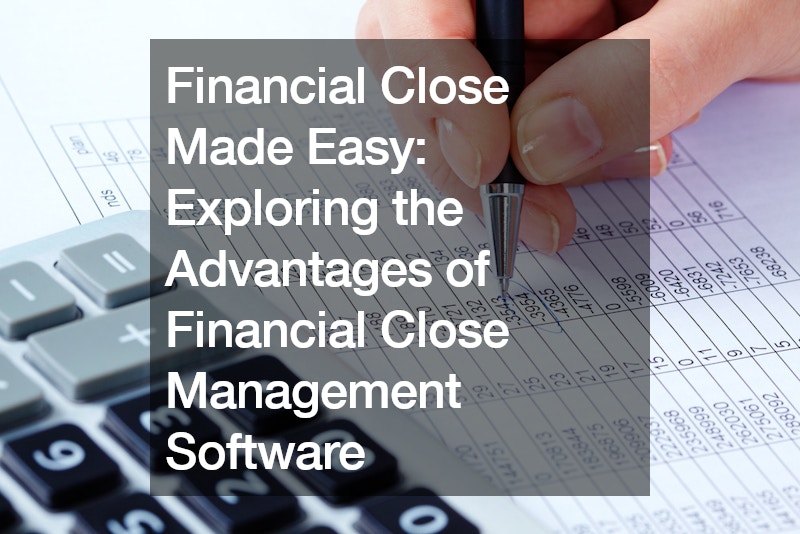
For many businesses in the UK, the financial close process can be time-consuming and error-prone. Juggling manual tasks, spreadsheets that seem to multiply like rabbits, and tight deadlines often leads to stress, late nights, and potential inaccuracies. Imagine a world where the financial close process is streamlined, efficient, and even; dare we say; enjoyable?
Financial close management software offers a powerful solution, bridging the gap between the traditional spreadsheet-heavy approach and a modern, automated solution. This innovative technology helps businesses of all sizes streamline the close process, boosting efficiency, enhancing financial accuracy, and freeing up valuable resources to focus on strategic growth initiatives.
Let’s delve deeper into the advantages of financial close management software and explore how it can transform your financial close process.
The Financial Close Explained:
The financial close is a critical monthly or quarterly process where companies finalize their financial records for a specific period. It involves tasks like:
Reconciling accounts: Ensuring accounts payable and receivable balances match supplier invoices and customer receipts. Journal entries: Recording any necessary adjustments to financial statements. Closing procedures: Finalizing accounts and preparing financial statements like the income statement and balance sheet. The Challenges of Manual Financial Close Processes:
Traditionally, the financial close relies heavily on manual data entry and spreadsheet manipulation. This approach presents several challenges:
Time-consuming: Manually processing large volumes of data takes considerable time, diverting resources from other critical tasks. Prone to errors: Manual data entry increases the risk of errors, leading to inaccurate financial statements and potential compliance issues. Lack of visibility: Spreadsheets provide limited visibility into the overall financial close process, making monitoring progress and identifying bottlenecks difficult. Limited collaboration: Collaboration between departments involved in the close (e.g., accounts payable, receivable, and treasury) can be cumbersome. Financial Close Management Software to the Rescue:
Financial close management software automates various tasks within the closing process, offering significant advantages for UK businesses:
Improved Efficiency: Software automates tasks like data entry, reconciliations, and journal entries, freeing up valuable time for accountants to focus on analysis and decision-making. Enhanced Accuracy: Streamlined data entry and automated workflows minimize the risk of errors, resulting in more reliable financial statements. Increased Visibility: Real-time dashboards and reporting capabilities within the software provide a clear picture of progress at every close stage, allowing for better control and timely issue identification. Streamlined Collaboration: Financial close management software facilitates secure collaboration across departments. Users can share documents, track tasks, and communicate seamlessly, ensuring a smooth and efficient close process. Reduced Risk: Software automates tasks, ensuring better compliance with accounting standards and reduces the risk of errors and restatements. Scalability: As a business grows, its financial close needs become more complex. Financial close management software can scale with your business, accommodating increased data volumes and user needs. Choosing the Right Financial Close Management Software in the UK:
With various financial close management software options available in the UK market, choosing the right one for your business is crucial. Here are some factors to consider:
Company size and needs: Consider the size and complexity of your business operations and the specific features needed for your financial close process. Scalability: Choose software that can grow with your business and accommodate future needs. Integration capabilities: Ensure the software integrates seamlessly with your existing accounting and ERP systems. Security and compliance: Look for software prioritizing data security and compliance with UK accounting standards. Ease of use: Consider the software’s user-friendliness for your team’s technical expertise. Financial Close Made Easy with Technology:
Implementing financial close management software empowers your finance team to streamline the close process, improve accuracy, and gain valuable insights. By automating manual tasks, software frees up time for strategic analysis and financial planning, allowing your business to make better decisions based on accurate and timely financial data.
Conclusion:
In today’s fast-paced business environment, a streamlined and efficient financial close process is essential for UK businesses. Financial close management software offers a powerful solution, enabling companies to automate tasks, improve accuracy, and gain valuable financial insights. By embracing financial close management software, businesses can confidently navigate the closing process, ensuring a more efficient and accurate financial reporting cycle.
Beyond Efficiency: The benefits of financial close management software extend beyond just efficiency. With increased accuracy and real-time data visibility, businesses can better understand their financial health. This empowers them to make data-driven decisions, identify cost-saving opportunities, and optimize financial performance. Moreover, streamlined financial reporting allows businesses to easily meet regulatory deadlines and present stakeholders with a clear picture of their financial position.
Investing in the Future: Implementing financial close management software is an investment in the future of your business. By automating tedious tasks and minimizing errors, the software frees up your finance team to focus on strategic analysis and financial planning. This shift allows them to be more proactive in driving business growth and profitability. In conclusion, financial close management software is not just a tool; it’s a strategic investment that empowers UK businesses to achieve financial clarity, improve decision-making, and gain a competitive edge.
.





